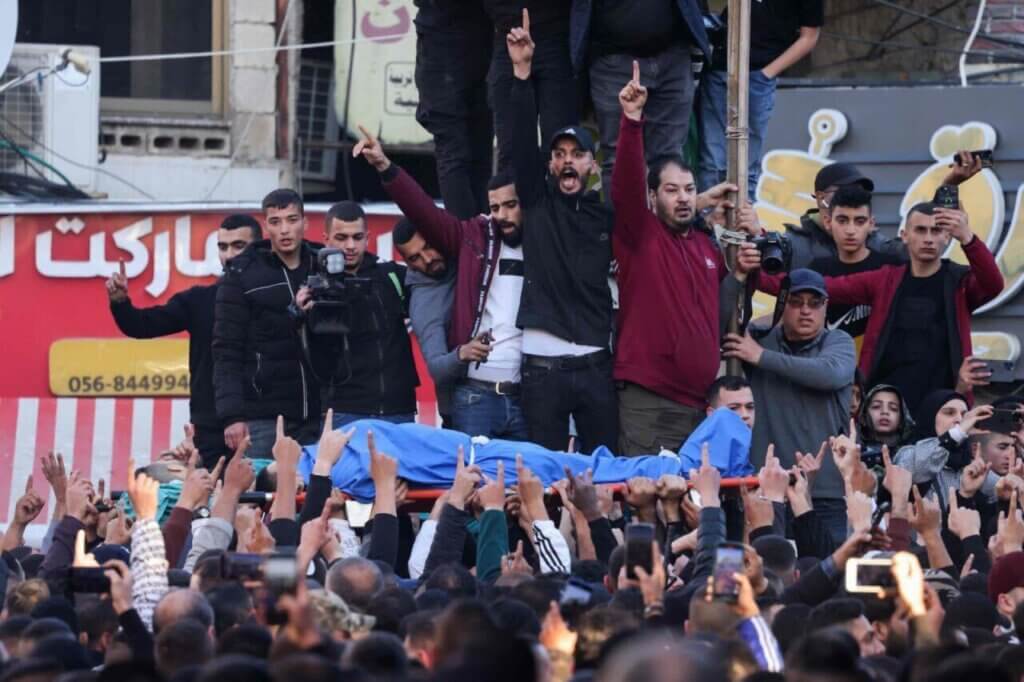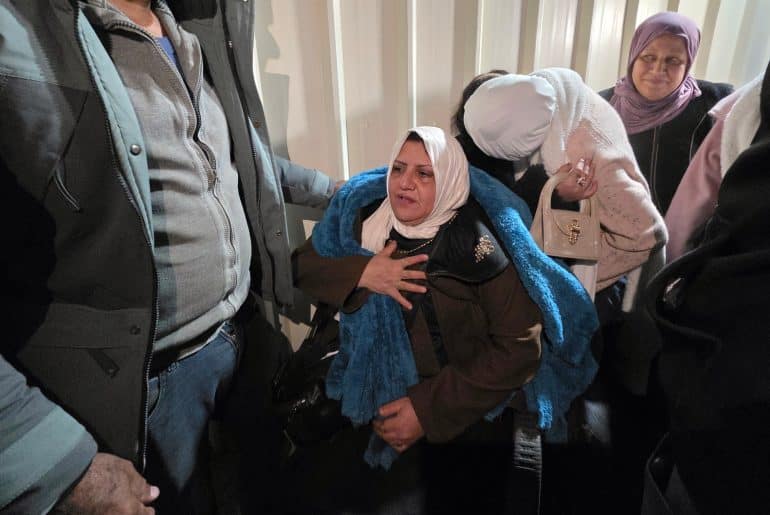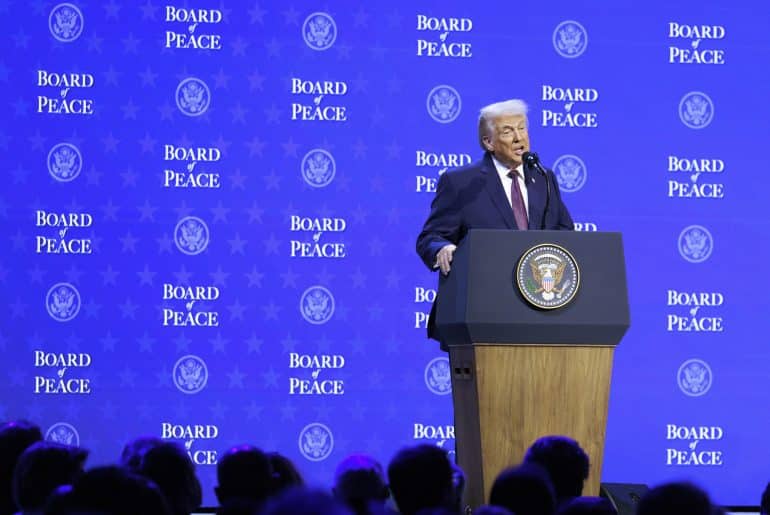On Thursday, March 16, an undercover Israeli special forces team from the Duvdevan Unit dressed in civilian clothing entered Jenin in two civilian cars on an assassination mission. The targets were two Palestinian resistance fighters from the Jenin Brigade, the armed umbrella group based in Jenin refugee camp that has been at the forefront of the revival of armed resistance across the West Bank since early 2022.
The two fighters were Nidal Khazem, 28, and Yousef Shreim, 29.
At 3 p.m., Khazem and Shreim were reportedly both riding a motorcycle on Abu Bakr Street in Jenin when the Israeli force fired on them without warning, shooting one in the head and the other in the back. A 14-year-old boy in the line of fire, Omar Awadin, was also shot dead while riding his bicycle.
A harrowing video shows a clip of Khazem lying prone on the ground as one of the Israeli assassins leans over him and fires another bullet into his head to confirm the kill.
As the Israeli unit withdrew, Palestinians attempted to chase after and rush the car, at which point the Israeli operatives opened fire on the crowd, fatally wounding 37-year-old Luai Zughayyar and injuring 20 others, including four who remain in critical condition, according to the Palestinian Ministry of Health.
Nidal Khazem was a prominent member of the Al-Quds Brigades, the armed wing of the Palestinian Islamic Jihad (PIJ), while Yousef Shreim was a commander in the local Jenin refugee camp branch of the Izz al-Din al-Qassam Brigades, the armed wing of Hamas.
“Nidal was the first one to confront the Israeli army,” a statement on the Telegram channel of Jenin’s Al-Qassam Brigades said. “Nidal was dramatically hurting the occupation.”
On October 26 of last year, Nidal Khazem spoke with Mondoweiss just outside Jenin refugee camp. This is his testimony.

From mechatronics engineer to resistance fighter
Khazem’s factional background was multifaceted, but he clearly identified with the PIJ as an armed resistance group. He occupied a central role in the Jenin Brigade but also headed an armed battalion known as Quwwat al-Bahaa’, or the Bahaa’ Force, named after Bahaa’ Abu al-Ata, the slain commander of the Al-Quds Brigades in the northern Gaza Strip (assassinated by an Israeli airstrike in November 2019).
Before becoming a fighter, Khazem had studied mechatronics engineering. Although he was out of practice, he understood English during the interview but insisted on having all questions repeated to him in Arabic, perhaps as a matter of principle.
At the time of the interview, Khazem was, somewhat surprisingly, the only resistance fighter who didn’t mind using his real name in public. “You can use my name,” he told me and another international journalist as we stood just outside Jenin refugee camp, an Israeli military drone hovering above us from a distance. It was 3:00 a.m. on October 26, 2022.
“I have no problem with using my name because we’re defending ourselves,” Khazem explained.
Five years of Khazem’s short life were spent inside Israeli prisons, with almost half of them spent in administrative detention without charge or trial. Khazem was most recently released from administrative detention in May 2021, and it was then that he joined the armed struggle.

Despite his large frame and imposing gait, the young man stood tall and confident but was not deliberately intimidating. Clad in black attire and sneakers, he was joined by two other junior fighters who kept watch around the perimeter in case of undercover Israeli special forces or a sudden army raid.
“When the armed resistance first started, [Israel] first tried arrests to stifle [the wave of resistance],” Khazem told Mondoweiss. “When that failed, they moved to assassinations.”
Those assassinations drove more and more youth towards armed confrontation, including Khazem. “When they would kill five,” he said, “the next day, they would face 25 [new fighters].”
His facial features remained consistent and unchanging as he explained the motivation of the camp’s youth to pick up the struggle after the death of their friends. When asked what drove him to bear arms, it became clear that it was both a conscious choice and an act born of necessity.
“They come here and kill our friends,” he said. “They killed both my cousins. They assault women. They continue their incursions into Al-Aqsa, and they…” Khazem fell silent for a moment as though the weight of it all was suddenly felt at once. Then he continued: “When they killed my cousin, I and five other fighters joined [the armed resistance].”
That cousin was Raad Khazem, a 28-year-old resident of the camp who carried out a shooting operation in April 2022 on Dizengoff Street in Tel Aviv, killing three Israelis and evading capture for hours in the middle of the city before he was finally gunned down. Khazem’s attack was one of the first “lone wolf” operations in 2022 to be used by the Israeli army as a pretext to launch Operation Break the Wave, which had already been set in motion a month earlier. As part of that military onslaught, the Israeli army also killed Raad’s brother, Abdul Rahman Khazem, in September 2022.

That wave of resistance, which had started in Jenin as early back as the Unity Intifada of 2021, quickly spread to Nablus, and by February, the Israeli army was already assassinating armed youth from the Old City. Nidal Khazem had often gone to Nablus to join in on the armed resistance there too. Images released on social media by friends, family, and comrades of Khazem show the young man with Farouq Salameh, 28, who was assassinated on November 3, 2022, Mateen Dabaya, 20, who was killed on October 14, 2022, and Adham Mabrouka, 26, one of the co-founders of the Lions’ Den who was assassinated with two other comrades on February 8, 2022.
Nidal chose to join the Islamic Jihad due to his impression of the group as uninterested in seeking power or gaining social status. Rather, he believed that the PIJ was in the honest pursuit of liberation. “There is nothing else,” he said.
“PIJ is not after money or position, you know…unlike Hamas!” he laughed with a wink directed at a man standing next to him, who was known to be affiliated with Hamas — the Jenin Brigade encapsulated a variety of fighters from different factions, fighting together when necessary, and separately when carrying out independent offensives.
“The PIJ has a goal, which is to struggle and liberate Palestine,” he said. “Honestly, I love the PIJ, and I love the Jenin Brigade, but in the end…we fight because we must.”
The social base of the resistance
During an interview with Mondoweiss on October 25, 2022, a resistance fighter with the Lions’ Den in Nablus, going by the nom de guerre Abu Bashir, voiced frustration that a small handful of young resistance fighters were saddled with the sole responsibility of fighting. “Why should fifty of us carry the burden of a nation?” he said.
Nidal Khazem’s own reflections during my interview with him earlier in the same month seemed to be more understanding of the supposed state of popular inertia among Palestinians. “The people are helping,” he acknowledged.
Mulling on his statement, he also commented on the feelings of isolation he and his comrades often felt. This was only confounded by the fact that Israel’s systematic policy of collective punishment was aimed at turning people against the resistance and implanting fear within Palestinian communities.
Again, Nidal seemed to know this all too well. “We don’t ask for help from people,” he clarified. “The [Palestinian] population is generally weakened, so we draw on each others’ strengths, and we draw on the strength of the camp.”
At the same time, Khazem was not blind to the reality on the ground. “All these Palestinians killed and all the battles that take place — these are the atmospheres of an intifada.”
In such circumstances, Israeli forces make it clear that anyone with any kind of association with resistance fighters will be treated as an enemy and punished accordingly, whether through arrests or punitive home demolitions. It is no wonder that some would choose to distance themselves from the armed youth in spite of the massive popular sympathy they enjoy.
“Some people move away from the hunted men because they’re scared,” Khazem said. “Some people take resistance fighters into their homes and give them refuge, but some also say, ‘please don’t come here, please.’ And this is because Israel punishes them,” he explained.
The punishments of those who are friends with or related to resistance fighters are most often in the form of arrests and home demolitions, but broader forms of collective punishment of the entire population are also common. “Look at Jalama checkpoint,” Khazem offers an example. “Why do [Israeli forces] keep it closed now? They do it to obstruct the merchants and their shops, they want to turn the situation against us.”
“They want to wear people down economically, emotionally — at every level,” he continued to explain. “And yet, those very same people, the people who are [drained]…they still tell us to keep going, to resist.”
“Our goal is to have all of Palestine liberated, but what we’ve done as a small group is an achievement.” When I asked him whether he imagines freedom, his answer was swift. “Yes, god willing. Look at the camp. The camp is a liberated area.”
His observation wasn’t wrong. There is a reason why he was eventually assassinated in Jenin city — that is, outside of the refugee camp and far from the guerilla haven he and his comrades had carved for themselves and their community. “But as the Jenin Brigade,” he qualified. “We can’t liberate Palestine.”
That is when I asked him how he expected to move from liberating the camp — by preventing the near-daily Israeli incursions — to liberating the whole of Palestine.
“The people must wake up, no one is awake,” he answered. Taking a moment away from the conversation, Khazem looked at the drone drawing nearer to where we stood. Responding to whether or not he was afraid of Israeli special forces assassinating him, he replied calmly and firmly: “Not at all. We are waiting for them.”

The complicity of the Palestinian Authority
Only a few days after the barbaric assassination of Nidal Khazem, the Palestinian Authority (PA) met with Israeli, American, Jordanian, and Egyptian security representatives in the Egyptian city of Sharm El-Sheikh on March 19, the second meeting of its kind since the Aqaba Summit in late February. The purpose of these meetings is to stop the bourgeoning armed resistance movement in the West Bank, which has evolved well beyond the influence and control of the PA.
This evolution was not for lack of trying on the PA’s part. Only a few months ago, in September and October of 2022, the PA attempted to take on Israel’s role of quelling the armed resistance by arresting several resistance fighters in Nablus, including a Hamas-affiliated Lions’ Den member, Musab Shtayyeh.
The PA also tried to bribe the fighters off the streets, offering them promises of amnesty for having taken up arms and a permanent position in the PA security forces, in addition to monetary incentives.
Nidal Khazem was one of the many fighters the PA failed to persuade. “The PA tried to quell us, they offered us many things, even offered them to me,” he told Mondoweiss. Then, with a degree of pride, he said: “but I refused. I chose a path, and I have stuck to it ever since.”
More often than not, the PA repression campaign turned from the carrot to the stick. As early as 2021, the PA first began its escalation against the armed presence in the camp at the behest of Israeli security officials. According to Khazem, the campaign to target fighters by the PA lasted for at least six months.
“The PA took us on, and they arrested some four young boys, but it couldn’t do anything,” Khazem explained. “That’s when the Israelis started to come to arrest us.”
“That is also when the [Palestinian resistance] operations outside the camp started, including shooting at military checkpoints,” he continued.
After refusing to turn himself in to the PA, Khazem himself became one of their targets in the camp. “They tried to shoot at me twice in the last year and a half,” he told Mondoweiss.
In the wake of Nidal Khazem’s assassination, his father, Amin Khazem, wrote a post on social media directed at the PA’s commander in Jenin.
I write with the knowledge that such headquarters only work in the service and maintenance of the security of the occupation.
Amin Khazem, father of Nidal Khazem
“As for what is referred to as the headquarters of the so-called Palestinian security [forces],” Amin wrote, “I will not forget that the detainment of my son was at the top of you and your boss’s priorities.”
The bereaved father went on to emphasize the role of the PA in crushing Palestinian hopes of deterring Israel’s ongoing killing sprees, settler violence, and land confiscation. “I write with the knowledge that such headquarters only work in the service and maintenance of the security of the occupation,” Amin stated.

Inheriting a world not theirs
If the armed youth are afforded their banality and flaws, it becomes compulsory to concede that many are heartsick and wearied by loss, even if they maintain their determination to fight, whether by rifle or by stone.
In doing so, the movement they created became less about the individual fighters and more about the ideas of change they encapsulated, taking on a life of their own well beyond their death.
“Ibrahim is an idea, and ideas don’t die,” a comrade of the slain Ibrahim al-Nabulsi told Mondoweiss, on the commemoration of what would have been al-Nabulsi’s 19th birthday.
As Palestinian youth scramble to secure what little arms they can, they have drawn attention and visibility, making them targets of Israeli assassination missions. They slowly organized themselves into groups and ultimately had no choice but to look out for one another because they had no one else to protect them.
They became symbols — for their enemies and loved ones — but they remain neither outlaws nor saints. Like most young people navigating the world, they are youth who have come to recognize the distinction between the world they inherited and the world they want to see. They had the courage to revolt against that world and change it, even if only incrementally.
Mariam Barghouti
Mariam Barghouti is the Senior Palestine Correspondent for Mondoweiss.




As a Canadian I am disgusted with the Israeli government and deeply saddened for the people of Palestine. What Israel is doing is apartheid and if you don’t believe it, just try opening your damn eyes. God bless the people of Palestine and may the chains that Israel has placed on the people be unlocked very soon.
Looking at the photos of these young men and reading Miriam quoting some of them, made me think of my son. He is a principled and caring young man like these young men. He has been able to live his hopes and dreams. He has never been deprived of his freedom, his right of self determination, his dream of becoming a husband and a father, a provider for his family. We are all equal in the sight of God. We are all God’s children. Not a single one of us deserves what is meted out to Palestinians, young and old.
Section 5 of Mondoweiss Comments Policy states:
No calls for violence or glorification or celebration of violence. Against anyone. Ever.
So here we have an essay that clearly glorifies an armed Islamic Jihad gunman. What’s the point of having a comments policy which is violated by the editors themselves?
The most harrowing fact about all of this is how the Palestinian Authority is complicit in assassinating these young men. The PA works against its own people and colludes with Israeli occupation killers. Resistance in the West Bank would be in a much better position if it weren’t for the treachery. Look at how fast they get discovered and killed!
An Israeli civilian who was mortally wounded in the terrorist attack in Tel Aviv on March 9 , died today of his wounds.
His name was: Or Eshkar, age 33